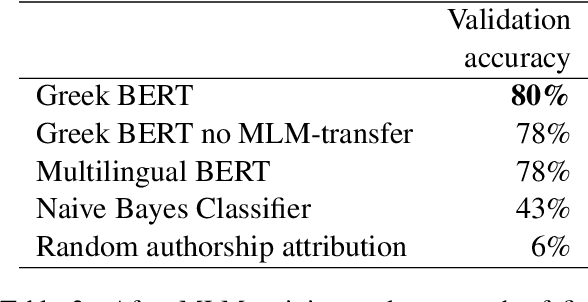Yorgos Pantis
Teaching Transformers to Solve Combinatorial Problems through Efficient Trial & Error
Sep 26, 2025Abstract:Despite their proficiency in various language tasks, Large Language Models (LLMs) struggle with combinatorial problems like Satisfiability, Traveling Salesman Problem, or even basic arithmetic. We address this gap through a novel approach for solving problems in the class NP. We focus on the paradigmatic task of Sudoku and achieve state-of-the-art accuracy (99\%) compared to prior neuro-symbolic approaches. Unlike prior work that used custom architectures, our method employs a vanilla decoder-only Transformer (GPT-2) without external tools or function calling. Our method integrates imitation learning of simple Sudoku rules with an explicit Depth-First Search (DFS) exploration strategy involving informed guessing and backtracking. Moving beyond imitation learning, we seek to minimize the number of guesses until reaching a solution. We provide a rigorous analysis of this setup formalizing its connection to a contextual variant of Min-Sum Set Cover, a well-studied problem in algorithms and stochastic optimization.
BERT in Plutarch's Shadows
Nov 10, 2022



Abstract:The extensive surviving corpus of the ancient scholar Plutarch of Chaeronea (ca. 45-120 CE) also contains several texts which, according to current scholarly opinion, did not originate with him and are therefore attributed to an anonymous author Pseudo-Plutarch. These include, in particular, the work Placita Philosophorum (Quotations and Opinions of the Ancient Philosophers), which is extremely important for the history of ancient philosophy. Little is known about the identity of that anonymous author and its relation to other authors from the same period. This paper presents a BERT language model for Ancient Greek. The model discovers previously unknown statistical properties relevant to these literary, philosophical, and historical problems and can shed new light on this authorship question. In particular, the Placita Philosophorum, together with one of the other Pseudo-Plutarch texts, shows similarities with the texts written by authors from an Alexandrian context (2nd/3rd century CE).
 Add to Chrome
Add to Chrome Add to Firefox
Add to Firefox Add to Edge
Add to Edge